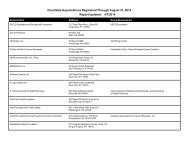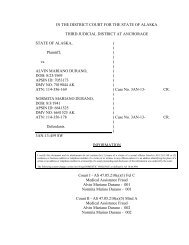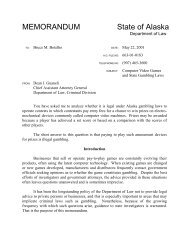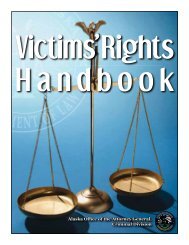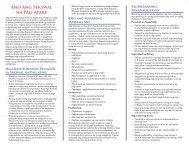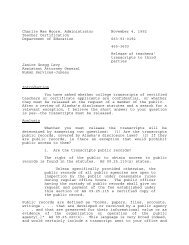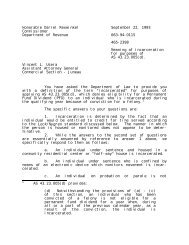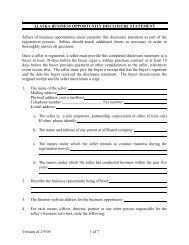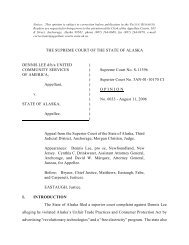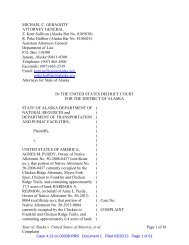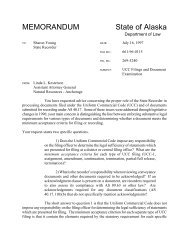Initial Report and Recommendations - Alaska Department of Law
Initial Report and Recommendations - Alaska Department of Law
Initial Report and Recommendations - Alaska Department of Law
- No tags were found...
Create successful ePaper yourself
Turn your PDF publications into a flip-book with our unique Google optimized e-Paper software.
During the public testimony <strong>and</strong> the public comment period, one message was<strong>of</strong>ten repeated: Congress should restore the federal funding opportunities for tribeslocated within the boundaries <strong>of</strong> all municipalities listed in Public <strong>Law</strong> 108-199, section112(a)(2)(b). The Commission makes this recommendation because as a matter <strong>of</strong> state<strong>and</strong> federal law, tribes possess undisputed civil jurisdiction for limited matters. A tribe'slocation should not be a barrier for accessing tribal court funding.“There is no equal access to justice in <strong>Alaska</strong>. Urban communities are able to usepolitical strength to ensure that their communities have police protection, fire protection, <strong>and</strong>well-funded court systems. Rural communities are without police protection <strong>and</strong> rely almostentirely on a state trooper that visits the community when a serious crime is committed orthrough a regularly scheduled visit. Volunteer fire fighters do relatively well withsubst<strong>and</strong>ard equipment, in most cases. Many <strong>of</strong> the people charged with breaking the law ina remote rural community have to be tried in urban courts outside their communities.”Edward K. Thomas, President,Central Council <strong>of</strong> the Tlingit <strong>and</strong> Haida Indian Tribes <strong>of</strong> <strong>Alaska</strong>The Commission noted the existence <strong>of</strong> two types <strong>of</strong> disparities in rural <strong>Alaska</strong>ns’ability to seek culturally appropriate access to the justice systems. Some victims areuncomfortable participating in the state justice system because <strong>of</strong> cultural reasons,geographical reasons, or both. 130 Other victims are similarly uncomfortable accessingtribal justice systems because <strong>of</strong> relationships with the opposing party or with the tribalcourt administration or adjudicators; in a small community, the opposing party may be acousin or the presiding Elder may be a gr<strong>and</strong>father to the plaintiff. To begin to remedythese problems, the Commission recommends that training <strong>and</strong> technical assistance beprovided to judges <strong>and</strong> support staff in both the <strong>Alaska</strong> Court System <strong>and</strong> tribal courtsthat will better inform <strong>and</strong> instruct participants in both systems to be aware <strong>of</strong> <strong>and</strong>appreciate the cultural differences <strong>and</strong> implications <strong>of</strong> their actions in rural <strong>Alaska</strong>, thepopulation <strong>of</strong> which, as noted previously, is predominately Native. 131 In addition, theCommission recommends that the state collaborate more with tribal courts, 132 provide<strong>Alaska</strong> Native language translators throughout the <strong>Alaska</strong> Court System, <strong>and</strong> increasetraining on cultural competency 133 <strong>and</strong> effective diversion programs. 134 The tribes shouldalso establish guidelines for responding to conflicts between those who are adjudicated developed video capability so that a probation <strong>of</strong>ficer can supplement on-goingsupervision <strong>of</strong> <strong>of</strong>fenders in rural communities. A teleconferencing procedure may work for certaincourt cases as well.128 Recommendation 49.129 The <strong>Alaska</strong> Court System’s Family <strong>Law</strong> Self Help Center is a currently available online resource. Thewebsite is www.state.ak.us/courts/selfhelp.htm.130 See, Supreme Court Committee on Fairness <strong>and</strong> Access <strong>Report</strong>, “many citizens believe that the justicesystem is unfair to ethnic <strong>and</strong> cultural groups.” At p. 49.131 Ideally, this would best be accomplished through a collaborative effort <strong>of</strong> the State, tribal, <strong>and</strong> Nativenon-pr<strong>of</strong>it regional organizations, with a coordinated training <strong>and</strong> technical assistance program.132 See <strong>Alaska</strong> Natives Commission Final <strong>Report</strong>, Vol. II, p. 61 (State <strong>and</strong> federal governments shouldcreate <strong>and</strong> utilize all possible opportunities for tribes to demonstrate their respective capacities toregulate tribal members).133 See, Supreme Court Committee on Fairness <strong>and</strong> Access <strong>Report</strong>, “[j]udges <strong>and</strong> court personnel do nothave regular cross cultural training about ethnic <strong>and</strong> cultural subgroups living in their areas.” <strong>Report</strong> atp. 58.134 Recommendation 50.<strong>Alaska</strong> Rural Justice <strong>and</strong> <strong>Law</strong> Enforcement Commission - Page 60



